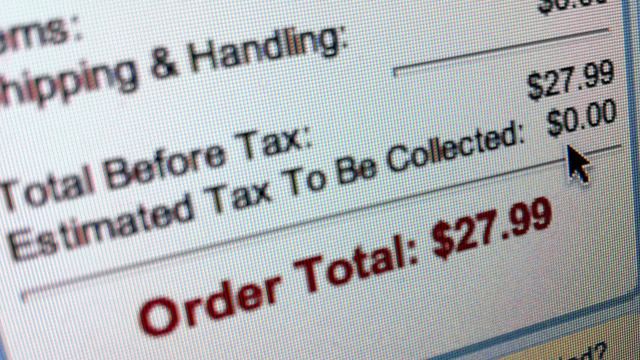 Ronald Reagan had a knack for cutting through the rhetorical fog that surrounds everyday thinking: “Government’s view of the economy could be summed up in a few short phrases: If it moves, tax it. If it keeps moving, regulate it. And if it stops moving, subsidize it.” How true.
Ronald Reagan had a knack for cutting through the rhetorical fog that surrounds everyday thinking: “Government’s view of the economy could be summed up in a few short phrases: If it moves, tax it. If it keeps moving, regulate it. And if it stops moving, subsidize it.” How true.
Sure, government needs more money–and wants more money. The same goes for all individuals as well. But we live within our means, doing without and downscaling if we don’t have money for things we’d like to have.
Should states be entitled to collect online taxes for sales that happened elsewhere? In some cities, taxes are determined not where the sale took place but where the delivery happened. Accordingly, some argue that online giant Amazon shouldn’t collect a local sales tax for Seattle, but can be forced to collect for the delivery location.
Assuming that all sales should be taxed, might it be fairer for a New York tourist traveling through South Dakota to demand that sales taxes be forwarded on to his home state, which both wants and needs the income? How much different is the transaction with Amazon that probably happened in Seattle?
Smaller overhead-ridden local business are losing money to the unfair advantage that a retailing behemoth like Amazon doesn’t have to worry about. Online means little brick and mortar. Price breaks go with volume selling. Then add no online taxes to round out the differential.
Local retailers use the same argument to keep Walmart out of town. Mom-and-pop operations can’t compete and will be “unfairly” run out-of-business. No mention that mom and pop are probably basking on a Hawaiian beach with their high profits. In fact, consumers prefer Big Walmart in a way that they don’t like Big Government. It’s private and competitive.
Laissez faire capitalism shouldn’t mean “leveling the playing field” for the less competitive and incompetent, such as we often get with subsidies. Too bad we can’t still ask Richard Sears if his new business model shared anything in common with Walmart today.
My church deliberately overbudgets so as to be able to announce an “urgent” lack of funds in fundraising appeals. Government should also think outside the habitual box, if tax revenue is falling short, to ask if taxes are being collected for unnecessary purposes.
Do we really need public libraries, for example, when Amazon is often selling used books for just one cent (plus nominal shipping)? Or have post-book libraries become just another tax sink and entertainment venue, with little to do with their original mission of reading and education for a public that could hardly make ends meet?
Why is 1992 convicted torturer-murderer Charles Rhines still enjoying the comforts of South Dakota’s death row, when political killers like the ex-soldier Timothy McVeigh have since been expeditiously convicted and put to death in just four years? Isn’t a lot of our desperate tax “need” being wasted on nest-feathering lawyers and judges and politicians?
In short, governments should be looking for ways to cut back on taxation, keeping “services” and “assistance” a lot more austere than they are now. Increasing taxes on sales hurts an already strapped lower and middle class, with more money being drained out of families for vague “redistribution” to who knows what kinds of liberal do-gooder programs.
 Ronald Reagan had a knack for cutting through the rhetorical fog that surrounds everyday thinking: “Government’s view of the economy could be summed up in a few short phrases: If it moves, tax it. If it keeps moving, regulate it. And if it stops moving, subsidize it.” How true.
Ronald Reagan had a knack for cutting through the rhetorical fog that surrounds everyday thinking: “Government’s view of the economy could be summed up in a few short phrases: If it moves, tax it. If it keeps moving, regulate it. And if it stops moving, subsidize it.” How true.